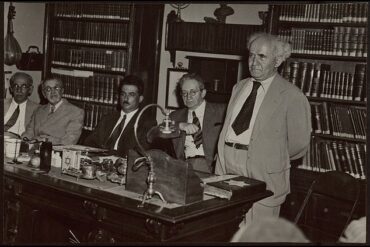Member of Knesset Betzalel Smotrich (National Union) dominated the news cycle early this week when he said he wants to see the State of Israel governed according to Torah law.
Smotrich made his comments on Kan News Monday morning, following similar remarks during his speech at a Yom Yerushalayim event on Sunday at Jerusalem’s Merkaz HaRav yeshiva.
At the yeshiva, the lawmaker declared that he is seeking to become Israel’s justice minister “in order to restore our judges as of old” and to restore Torah law to the Jewish state.
Being that his statements came during a tense election cycle, Betzalel Smotrich’s comments naturally led to fear mongering from prominent opposition lawmakers attempting to frighten voters away from supporting Prime Minister Binyamin Netanyahu’s Likud party or its natural coalition partners.
Member of Knesset Shelly Yacimovich (Labor) went so far as to call Smotrich and his political allies “a great danger to human freedom and the era of enlightenment.”
Netanyahu himself responded to the controversy by tweeting that “The State of Israel will not be a halakhic state.”
In his Monday morning radio interview, Betzalel Smotrich clarified that he doesn’t see Israel returning to Biblical times but insisted that the Torah is a morally superior code for Israeli law to draw from than the Turkish or British common law found in Israel’s current legal framework.
“Torah laws are far superior to the halakhic state created here by Aharon Barak,” he said in reference to former Supreme Court President Aharon Barak’s aggressive efforts to westernize Israel through judicial activism.
“Why is a state of law in which the person who determines the laws is Aharon Barak and a small group of unelected people OK?” he asked rhetorically. “The State of Israel and the state of the Jewish people will return to be governed as it was governed in the days of King David and King Shlomo – by Torah law, obviously in accordance with our days, our challenges and economy and how society lives in 2019.”
Betzalel Smotrich later responded to his critics with a 1,300-word essay on his Facebook page, asserting that the Jewish people’s loss of political independence and long exile from our land caused us to forget the role of our own laws in governing a society.
Despite this, he said, it has always been the desire of Jews in exile not only to return to their land but also to their legal code.
“No we won’t return to the days of the Bible,” he clarified, conceding that “social realities” were different and need to be addressed differently.
“So let’s stop being afraid of our roots. First and foremost, uproot the ignorance… and implement as much as is possible from all that is good in [the Torah] in daily life.”
With this, Betzalel Smotrich touched on a powerful point. Restoring a Jewish legal structure to the State of Israel need not be an all or nothing endeavor. Lawmakers and activists truly interested in making the state more expressive of Jewish laws and values should simply shelve the aspects of halakha that frighten people and focus exclusively on advancing legislation that meet the real material needs of the Israeli people better than current policies.
For example, most Israelis drown in debt while banks charge interest and the banking authority slaps fines on community organizations that lend money free of interest. Smotrich should take on the banks and make it clear to the people that charging interest is actually a Torah violation for all parties involved (although the heter iska might remove the halakhic prohibition, the Jewish people’s values would be better expressed through an interest-free banking system).
Should the Shmita year only impact the status of produce or should struggling people across the country have their debts remitted? Even Z’ev Jabotinsky, despite his deep hostility to socialism, believed Israel’s economy should implement the Yovel year as a curative reset to the free market system he championed.
The same approach should be taken when it comes to minority rights. Would Palestinians benefit more or less from Israel adopting the legal framework of ger toshav than they do living under the military occupation they currently endure? Are Israel’s halakhic obligations to minority populations more or less just than the colonial structures erected by Zionism?
What about selling weapons to human rights violators? The Rambam teaches us in Hilkhot Avodat Kokhavim 9:8 that it is forbidden to sell gentiles weapons or any articles that can cause harm to people. Yet Israel’s arms industry equips murderous regimes all over the world, from the Philippines and Myanmar to Cameroon and South Sudan.
It was actually Aharon Barak – as attorney general in the 1970s – who approved arms sales to Argentina and Chile during Washington’s Operation Condor aimed at liquidating opposition to American-backed rightist dictatorships in the Southern Cone. Argentina used these Israeli weapons to kill tens of thousands of leftists – including roughly two thousand Jewish activists from the Socialist Zionist Hashomer Hatzair movement.
If Betzalel Smotrich were to challenge Israel’s arms industry, banking system, judiciary and tycoons on halakhic grounds, could the Liberal Zionist parties really oppose him? If he were to start focusing his legislative efforts on making Israel a society that expresses the Torah’s social conscience, could the media attack him?
Those condemning Smotrich for his comments have expectedly pointed to all the Torah’s statutes that appear to conflict with liberal Western values. And despite this, Betzalel Smotrich has impressively doubled down. But now he should actually take the issue further and place it at the center of the current election cycle. He should force all the candidates and parties to weigh in on what it means for a state to be “Jewish” – not decoratively Jewish but substantively Jewish – and whether or not Israel’s Torah has answers to people’s material needs.
All those interested making the State of Israel more substantively Jewish should also question why these conversations haven’t yet taken place. Is it because such discussions would lead to an oppressive Iranian-style halakhic state? Or is it because asking these questions directly challenge Israel’s ruling class and dominant institutions?
Smotrich is correct in claiming that our people had always planned a return to our own legal structures. He’s also correct in stating that we shouldn’t have an inferiority complex when it comes to our own identity and values. But if he wants to be successful in this fight, he should focus on legislating halakhic positions that would cause the state to better meet the needs of the people – Jews and gentiles alike. His activists should begin organizing in Israel’s periphery, listen to the people, show them how Torah-inspired socio-economic policies can address their needs and expand the National Union’s sectoral base.
As a freshman lawmaker in the previous Knesset, Betzalel Smotrich was not a very impressive figure. His statements were often offensive and his behavior seemed that of a political novice desperate for media attention. But now he appears to have developed a mature voice and has the potential to raise the intellectual level of discussion on issues crucial to Israel’s character and future. This is a pivotal moment for Betzalel Smotrich and an opportunity for him to transcend beyond his narrow nationalist political camp by challenging the nation’s elites and institutions on universalist grounds.





